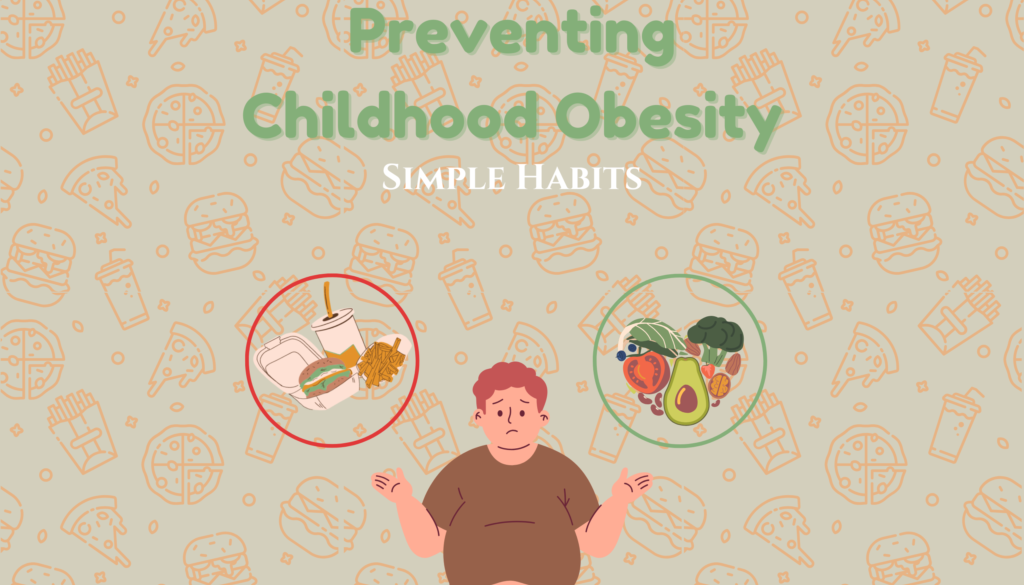Childhood Obesity: Simple & Healthy Habits for the Whole Family
Childhood obesity is a growing concern worldwide, with its prevalence nearly doubling over the past few decades. This alarming trend poses serious risks to children’s physical and mental health, including increased chances of developing diabetes, heart disease, and low self-esteem.
The good news? Childhood obesity is preventable and manageable through thoughtful lifestyle changes that benefit not only children but the entire family. By adopting healthy habits, parents can empower their children to thrive and build a foundation for lifelong wellness.
What is Childhood Obesity?
Childhood obesity is defined as having excess body fat that negatively impacts a child’s health and well-being. It is typically measured using the Body Mass Index (Link to calculate your BMI), adjusted for a child’s age and sex. Beyond the immediate physical effects, such as joint pain and fatigue, obesity in childhood can lead to long-term consequences like:
- Type 2 diabetes
- High blood pressure
- Heart disease
- Poor self-esteem
Understanding the causes of childhood obesity is the first step toward prevention.
Causes of Childhood Obesity
1. Poor Diet
Unhealthy eating habits are a significant contributor to childhood obesity. Diets high in sugary snacks, fast food, and sugary beverages provide excessive calories without essential nutrients. This leads to rapid weight gain and poor overall health.
2. Lack of Physical Activity
Children today spend more time in front of screens than ever before, engaging in sedentary activities like watching TV, playing video games, or scrolling on devices. Limited physical activity reduces calorie expenditure, making weight gain more likely.
* I have wrote about the importance of outdoor activities for kids growth in this POST.
3. Genetics
Genetics can predispose some children to obesity, but it’s not the sole factor. Lifestyle choices, including diet and exercise, often have a larger impact on a child’s weight.
4. Emotional and Environmental Factors
Stress, emotional eating, and environmental influences such as easy access to unhealthy food and a lack of safe spaces for exercise can also contribute to obesity. Children often turn to comfort foods during periods of stress or emotional difficulty, leading to overeating.
How to Prevent Childhood Obesity
The key to preventing childhood obesity lies in fostering healthy habits that the entire family can embrace. Here’s how:
1. Encourage Healthy Eating Habits
- Offer a variety of nutrient-dense foods, such as fruits, vegetables, whole grains, and lean proteins.
- Limit processed foods, sugary snacks, and beverages.
- Teach children about portion control and mindful eating.
2. Be a Role Model
Children learn by example, so parents should model the behaviors they want their kids to adopt. Demonstrate a positive attitude toward healthy eating and physical activity. Avoid labeling foods as “good” or “bad” to prevent food-related guilt.
3. Promote Regular Physical Activity
Physical activity is crucial for maintaining a healthy weight and overall well-being. Encourage children to:
- Engage in at least 1 hour of physical activity daily.
- Try fun activities like biking, swimming, or team sports.
- Choose active family outings, such as hikes or walks in the park.
4. Limit Screen Time
Excessive screen time is strongly associated with obesity. Set limits of 1-2 hours per day for recreational screen use. Encourage outdoor play and other engaging activities that involve movement.
5. Create a Family Meal Plan
Involving the whole family in meal planning and preparation fosters teamwork and encourages healthy food choices. Plan balanced meals that everyone can enjoy, and set aside time to eat together as a family.
Benefits of Healthy Habits
Adopting healthy habits offers numerous benefits beyond preventing obesity:
- Improved mental health: Exercise and proper nutrition can reduce stress and boost mood.
- Better sleep: Regular activity and a balanced diet promote restful sleep, essential for growth and development.
- Lower risk of chronic diseases: Establishing healthy habits early lowers the risk of conditions like diabetes and heart disease later in life.
- Stronger family bonds: Cooking and exercising together can strengthen relationships and create lasting memories.
When to Seek Professional Help
If your child is showing signs of obesity or if you’re concerned about their weight or eating habits, it’s important to consult a pediatrician. A healthcare professional can provide personalized advice and, if needed, recommend additional resources like a dietitian or counselor to support your child’s health journey.
Preventing childhood obesity doesn’t require drastic changes—it’s about making small, consistent adjustments to your family’s daily routine. By encouraging healthy eating, regular physical activity, and limiting screen time, parents can set their children on the path to a healthier, happier future.
Remember, positive reinforcement and a supportive environment are key to helping kids develop lifelong habits that promote health and well-being.
External Links:
What healthy habits have worked for your family? Share your tips or ask questions in the comments below! Don’t forget to follow our blog for more practical advice on healthy living and family-focused content.



